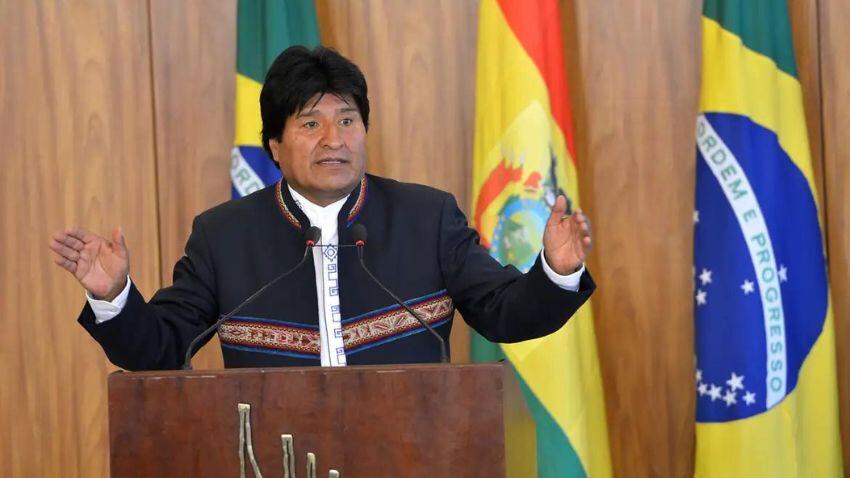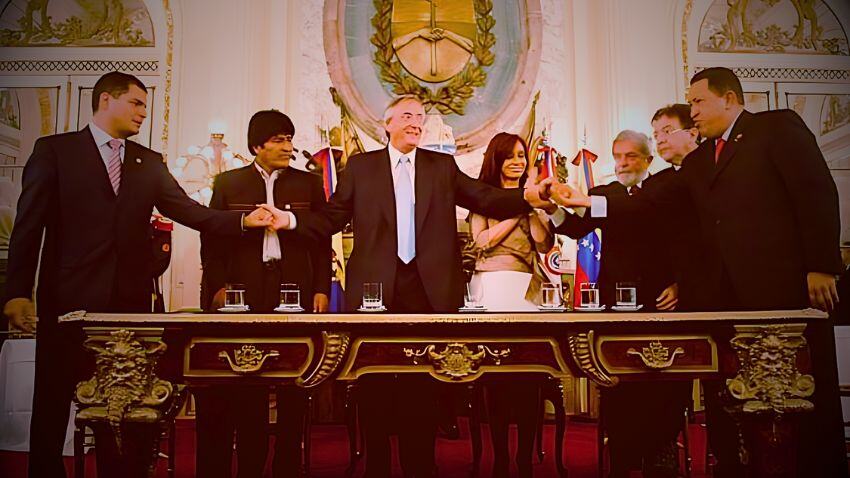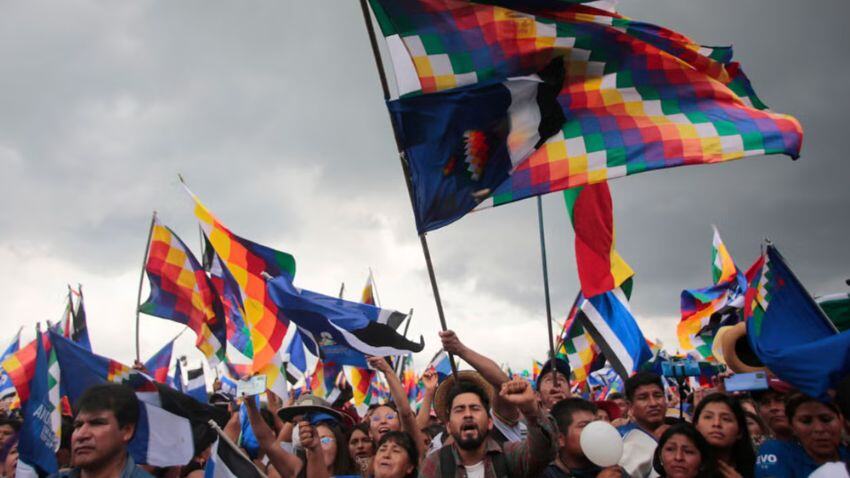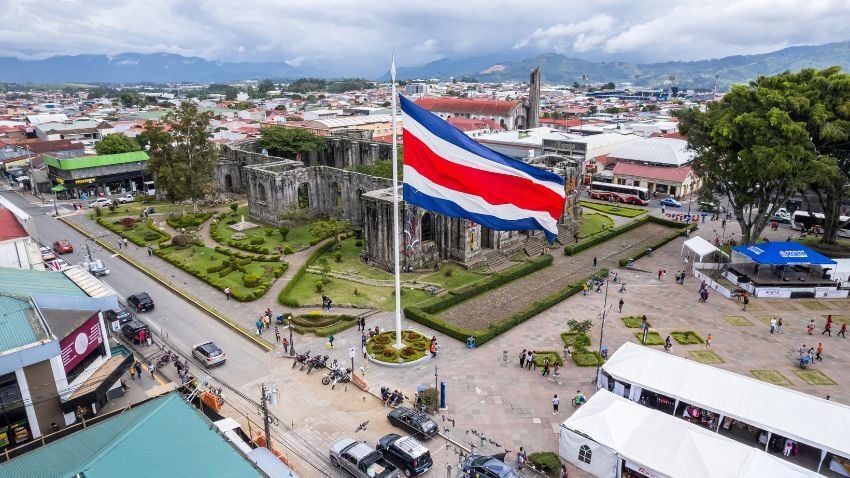Latin America’s Rightward Shift Continues In Honduras
Honduras’ newly elected president, Nasry Asfura of the conservative National Party, was sworn in on January 27, 2026. The election, held on November...

8 min read
On June 26, the streets of La Paz echoed with the roar of a panzer as soldiers smashed through the door of Bolivia’s government building. The scene was dramatic, yet in Bolivia, it was all too familiar. Another military coup attempt in Latin America might not even raise an eyebrow anymore. With 190 military interventions since its independence, it's almost routine for an ambitious general to wake up early, block roads with tanks, and announce the overthrow of the government. Bolivia's history with coups is as tumultuous as it gets, making this latest attempt feel like just another chapter in a well-worn book.
This time, however, the military coup attempt in Bolivia took an unexpected turn, marked by both its failure and its bizarre execution. General Zuniga, flanked by a handful of officers, crashed through the government building's door, only to be met by a furious President Luis Arce. In a scene that played out in front of the cameras, President Arce unleashed a tirade against General Zuniga, transforming the coup attempt into a dramatic confrontation that was anything but typical, even by Bolivia's standards.
As it turned out, Arce had dismissed General Zuniga as soon as the coup attempt began and appointed Vice Admiral Juan Arnez Salvador in his place. The new chief of staff spoke out against Zuniga, and President Arce called on the people to take to the streets in support, resulting in one of the world's shortest coup attempts.
General Zuniga calmly returned to his garrison without resorting to armed conflict or force. He was then immediately arrested. After his arrest, General Zuniga declared that he had been deceived, claiming President Arce had asked him to organize a staged coup d'état. He stated that the plot had been staged to boost President Arce's popular support.
It is fortunate that there were no casualties during the events, but it is important to understand the painful story behind Bolivia's turmoil. The situation may resemble a Latino soap opera, yet it highlights how our freedoms rest on fragile political grounds. Bolivia's drama is a stark reminder that you cannot entrust your freedom and wealth to politicians in any country. Therefore, preparing a Plan-B that works for you is not only wise but also easier than you might think with the right guidance. Having a backup plan ensures that you are ready to protect yourself and your family, no matter the political climate.

Without any moral obstacles, Morales ran in the 2019 presidential elections and declared himself the winner for a fourth term, dismissing fraud allegations.
The main controversy behind the failed coup attempt centers on Evo Morales, one of the dominant political figures in Bolivia since 2005. On December 18, 2005, Morales won the presidential elections and became Bolivia's first indigenous president. In Bolivia, where 62% of the population is indigenous, Morales' election as president was considered an important historical moment as it was perceived as a sign of the end of colonialism and the exclusion of indigenous peoples.
The vast majority of those elected president in the country's history were mestizos. Mestizo is a term used in Latin America to describe people who are a mixture of indigenous and European (usually Spanish) descent. These leaders were usually from the European or mixed-race elite classes, continuing the social and economic structures inherited from the Spanish colonial period.
Morales's party, the Movement for Socialism (Movimiento al Socialismo, MAS), became the dominant party. As its name suggests, it claimed socialism and equality. Morales began to replace some of the market-oriented economic reforms that preceded his term with a command economy. However, the post-Morales military intervention has nothing to do with a counter-revolution against socialism, although Morales' socialism has led to the further inefficiency of the troubled Bolivian economy.
Morales amended the Bolivian Constitution through a referendum on January 25, 2009. Following the approval of the new constitution, he secured a second term in the December elections of the same year. This event marked the onset of a political crisis, as both the 2009 constitution and the previous constitution limited the president to two consecutive terms.
To secure the right to run for a third term, Morales sought a ruling from the Constitutional Court, which was loyal to him. The Supreme Court decided that the presidential terms reset with the new constitution, allowing Morales to be elected for a third term in 2014.
However, Morales was unable to leave the presidency. As soon as his third term began, Morales made it clear that he wanted a fourth term. Since he could not try the reset method again, he proposed a new constitutional amendment. In the constitutional referendum held in February 2016, Morales lost the elections for the first time, ending his chances of becoming a "legitimate" president.
Initially, Morales promised to honour the referendum results. However, shortly after, he claimed that the referendum he had organized was rigged. Unable to achieve the desired constitutional amendment in the Assembly, Morales "reluctantly" turned to the Constitutional Court. The Court, in a "remarkable" display of constitutional interpretation, ruled that the two-term limit was "against human rights."
With no "legal" or "moral" obstacles in his way, Morales participated in the 2019 presidential elections and declared himself elected president for the fourth time, ignoring allegations of fraud. However, in his ambition to become the eternal and everlasting president, Morales failed to realize that he was losing the support of the population and even the major labour unions.
Immediately after Morales announced his bid for a fourth term, violent and widespread protests erupted across the country. Believing the conditions were ripe, the right-wing opposition, with active support from the police force, took control of the capital. Realizing he had no other options, Morales resigned on November 10, 2019. Two days later, he boarded a plane sent by Mexican President Andrés Manuel, seeking asylum in Argentina.
Morales' resignation escalated into a new constitutional crisis. According to the constitution, the vice president and the heads of both houses of parliament also resigned, plunging the country into a political vacuum. On November 12, 2019, Jeanine Anez, a member of the right-wing opposition party, declared herself president based on her own interpretation of the constitution and established an interim government.
As expected, protests were held against the government of self-appointed president Anez, which ended in bloodshed. Finally, in the elections held one year later, MAS emerged as the clear winner again. Anez was tried on charges of conspiracy and went to prison. This time, Morales' former economy minister, Luis Arce, became president. David Choquehuanca, a powerful figure in the leftist movement, was elected vice president.
After MAS won the elections, Morales returned to Bolivia on November 9, 2020, and announced that he felt obliged to participate in the presidential elections expected to be held in 2025. He made it clear that he intended to continue the constitutional crisis, although the Constitutional Court had already ruled against Morales’ re-election.
.jpg?width=850&height=478&name=Military%20Police%20walk%20amid%20tear%20gas%20outside%20the%20presidential%20palace%20at%20Plaza%20Murillo%20on%20June%2026%2c%202024%20in%20La%20Paz%2c%20Bolivia.%20(Gaston%20Brito%20Miserocchi_Getty).jpg)
Military Police walk amid tear gas outside the presidential palace at Plaza Murillo on June 26, 2024, in La Paz, Bolivia. (Gaston Brito Miserocchi/Getty)
The political instability that has been going on in Bolivia since 2009 is not the result of a left-right conflict from the Cold War period. The problem stems from the fact that the vested interest groups, led by Morales, are ready to do anything, without any limits, not to lose the power they have gained.
The Morales case has brought to light the empty claims of socialist democracy advocates. I am not at all surprised that socialist Morales is incapable of complying with the clear constitutional framework that he wrote. Socialism does not require a system of rule of law but an order of command. The principle of the rule of law is contradictory to socialism itself. If the rule of law prevails, there is no socialism; if socialism prevails, there is no rule of law.
Constitutional rules institutionalize general, abstract, and non-discriminatory rules of conduct that make complex social cooperation possible. This means that all individuals with natural rights are equal before the law and can pursue their own preferences as they wish, based on the principle of voluntarism. That's why the rule of law and the free market economy go hand in hand. The market economy cannot find the opportunity to develop without the rule of law, and wealth cannot be created anywhere the market economy is not developed.
Because socialism's fundamental goal is to equalize everyone in poverty, socialists have no tolerance for any form of freedom. In pursuit of material equality, socialists are compelled to plan and control the future. Planning is only possible by not allowing people to be free but by controlling and commanding them in every detail of their private lives.
That is why command economies cannot establish the rule of law. Therefore, it is not possible for a constitutional democracy to develop under socialism. Socialists like Morales lack the ability to set limits on their own behaviour. They don't even know the meaning of setting limits for themselves. So, they have no idea why it might be morally wrong to try to be elected president for the third or fourth time.

In the early 2000s, South America saw a rise in pink tide socialism, starting with Hugo Chavez in Venezuela in 1998, followed by Lula da Silva in Brazil, Kirchnerism in Argentina, Evo Morales in Bolivia and Rafael Correa in Ecuador.
In the early 2000s, the wind of socialism gained momentum in South America. Hopes were being instilled that this new type of socialism was not the old Cuban type of “red tide” but a new “pink tide” softer socialism. The process, which was triggered by Hugo Chavez coming to power in Venezuela in 1998, spread to South America, with Lula da Silva winning the elections in Brazil in 2002 and Kishnerism becoming dominant in Argentina in 2003. The last passengers of this “pink tide” socialism were Morales in 2006 and Rafael Correa, who won the elections in Ecuador in 2007.
So-called “pink tide” socialism has created disasters at different levels in the countries where it is implemented, especially in Venezuela. Although Bolivia seems to have been left out of these disasters, it can easily be seen that Bolivia has trapped itself in a circle of poverty at a certain level and that the Bolivian people have fallen victim to the political delusions of a few politicians.
However, Morales took a more pragmatic path than his peers, allowing the informal economy to self-regulate rather than establishing a full-fledged command economy. Nevertheless, Morales significantly increased public revenues by nationalizing natural mines, keeping capital movements under control, and redistributing a significant part of the income through social policies and public investments.
Although Morales's policies convinced European socialists that a new Norway was born in South America, subsequent developments showed that Bolivia had only managed to reduce absolute poverty by consuming its existing resources. Otherwise, Bolivia could not have made any progress towards producing wealth.
The reason why Bolivia has failed to become Norway is obvious to free-market economists. It is not natural resources that create wealth but the institutionalization of the principles of individual freedom and free trade. There is not enough space to discuss Norway's situation here, but I can say this much: Norway is a country that has become rich despite nationalization, not due to it.
Morales, clearly unaware of the meaning of freedom, assumes that he can turn natural resources into wealth through public investments, one of the oldest mistakes in the history of economics. It is unnecessary to be a prophet to predict that absolute poverty will increase in Bolivia as natural resources and foreign demand for these resources decrease, and natural resource management is left to the ineffective bureaucratic mechanisms.
In addition to these problems, Bolivia faces numerous other political and social challenges. The country is divided along ethnic and regional lines, with various interest groups competing for a larger share of the mines. This is further complicated by the lack of technological investment needed for mining and the absence of foreign investment.
Despite having nearly a third of the world's lithium deposits, one of the largest natural gas reserves, rich mineral deposits, and significant gold and iron mines, Bolivia still struggles with poverty. The list of Bolivia's natural resources is far more extensive than I mentioned here. However, as of 2022, Bolivia's public debt is approximately 80% of its GDP. How on earth has a country like this ended up with such high public debt? With the current economic management and leaders like Morales, there is little to prevent Bolivia from potentially following in Venezuela's footsteps.
To understand why Bolivia cannot emulate Norway, a glance at the Heritage Foundation's Economic Freedom Index provides some insight, though it is not a perfect measure. Bolivia ranks 165th out of 184 countries, with its economic status classified as repressed. In contrast, Norway ranks as the 10th freest economy in the world, with a status of "mostly free."

Bolivia's poverty is unlikely to improve, even with opposition in power, due to the resource curse, where ruling elites exploit natural resources to maintain political domination.
I don't know if Morales will run again, but even if the opposition comes to power, I doubt much will change regarding poverty. There's a concept known as the "resource curse," which suggests that poor countries rich in natural resources often struggle to develop market economies that generate wealth. This is because ruling elites can finance themselves through these resources rather than relying on creative labour and entrepreneurship. Political elites become the greatest enemies of economic freedom, maintaining political domination by converting natural resources into economic rents. Unfortunately, when I look at Bolivia, I see this curse in full effect.
I am unsure if Bolivia can escape this curse, but I know from nearly 25 years of experience that individuals can always help themselves and their families. It is unrealistic to expect politicians like Morales, who don't even know how to set limits for themselves, to respect your life, wealth, or choices. Therefore, countries that have not institutionalized the rule of law, have not embraced economic freedom, and have rejected the principles of free trade and free movement of capital cannot achieve political and economic stability. Countries that are still experimenting with allegedly new forms of socialism and dragging their people into adventures that are doomed from the start cannot be Plan-B countries.
History has shown that the best way to combat corrupt political regimes is to demonstrate that you have alternatives. If you haven't prepared an alternative plan for yourself yet, remember that there's no better time than today.
If you want the best intel from the expat world, including profitable offshore opportunities, little-known tax-saving strategies, and hard-won insights on immigration, passports, and Plan-B residencies, all delivered to your inbox every single week, then join our daily correspondence, EMS Pulse®. Currently enjoyed by over 84,000 expats and expat-hopefuls worldwide. Fill in the form below to join our newsletter free:

Written by Mikkel Thorup
Mikkel Thorup is the world’s most sought-after expat consultant. He focuses on helping high-net-worth private clients to legally mitigate tax liabilities, obtain a second residency and citizenship, and assemble a portfolio of foreign investments including international real estate, timber plantations, agricultural land and other hard-money tangible assets. Mikkel is the Founder and CEO at Expat Money®, a private consulting firm started in 2017. He hosts the popular weekly podcast, the Expat Money Show, and wrote the definitive #1-Best Selling book Expat Secrets - How To Pay Zero Taxes, Live Overseas And Make Giant Piles Of Money, and his second book: Expats Guide On Moving To Mexico.

Honduras’ newly elected president, Nasry Asfura of the conservative National Party, was sworn in on January 27, 2026. The election, held on November...

For a growing number of Americans, cost-of-living math no longer works. Housing feels harder to reach, everyday costs keep climbing, and long-term...

Costa Rica has become one of the most popular expat and digital nomad destinations in Latin America, known for its natural beauty, relaxed lifestyle,...